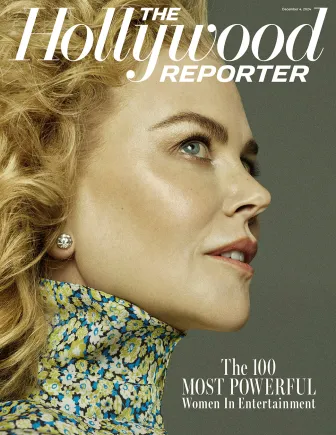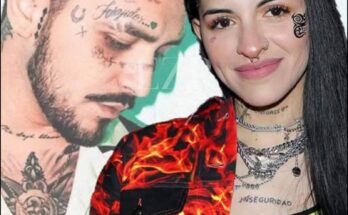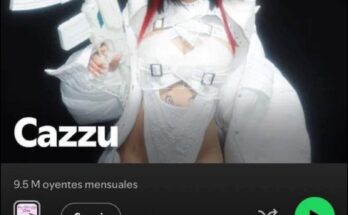The inexhaustible actress — fronting six major projects this year — opens up about her startlingly hypersexual role in ‘Babygirl’: “This is a place that I haven’t been.”
Nicole Kidman’s new film, Babygirl, opens with a scene moviegoers may think they have seen many times before — an actress having a very pretty orgasm. For a global movie star with five Oscar nominations and two Emmys, you might even consider the opening risqué. But it’s what follows that reveals Kidman to be in fresh cinematic territory and why she calls this role “a calling.” In subsequent scenes, director Halina Reijn divulges that the intended audience for the opening breathy performance had been the character’s handsome, loving husband (Antonio Banderas) — and Kidman delivers other, much more feral climaxes without him. In the A24 movie, a gender-flipped love letter to erotic thrillers like 9½ Weeks and Basic Instinct, Kidman plays a powerful CEO, wife and mother whose attraction to a brazen young male intern (Harris Dickinson) threatens to blow up her Instagram-perfect life.
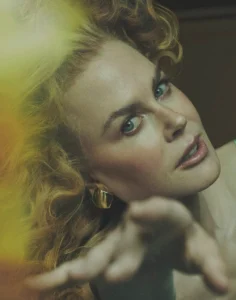
It’s a bracingly vulnerable performance, provocative even for the woman who raised eyebrows 25 years ago with Eyes Wide Shut, and a role that caps a year in which Kidman is, seemingly, everywhere. Her six 2024 projects include the soapy Netflix murder mystery The Perfect Couple, which became the most watched original streaming series in the U.S. in September; the Taylor Sheridan spy thriller series Lioness on Paramount+; and Lulu Wang’s prestige drama series for Amazon Prime, Expats. The crush of output is thanks in part to a scheduling quirk caused by the 2023 SAG-AFTRA strike, but it also reflects the rarefied position in which Kidman finds herself at age 57, more in demand than ever.
While much of Hollywood seems to have seen the hiring of more women in roles of creative leadership as a post-#MeToo talking point, Kidman has taken on the task in earnest, working with a stunning 21 female directors in the past seven years as an actress or a producer. “She is one of the few people who practices what she preaches when it comes to feminism and empowering women,” Reijn says. She also has locked arms with female co-producers like Reese Witherspoon on HBO’s Big Little Lies and Jamie Lee Curtis, who is producing the upcoming Amazon Prime series Scarpetta, in which Kidman plays the title character from Patricia Cornwell’s book series about a medical examiner. (“I’m learning all about autopsies,” Kidman says. “I know where all the body parts are.”)
Kidman, who is being honored with The Hollywood Reporter’s Sherry Lansing Leadership Award for her professional and philanthropic contributions, paused her breakneck schedule to talk with THR from the home in Nashville that she shares with her husband, country musician Keith Urban, and daughters Sunday, 16, and Faith, 14, about why Babygirl felt so “dangerous” to make, what her agent told her at age 40 that she didn’t believe and what she does with her — no kidding — downtime.
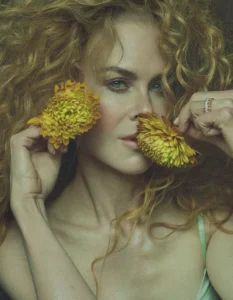
You described this movie to me as “a calling.” What was the calling?
A lot of times women are discarded at a certain period of their career as a sexual being. So it was really beautiful to be seen in this way. From the minute I read it, I was like, “Yeah, this is a voice I haven’t seen, this is a place that I haven’t been, I don’t think audiences have been.” My character has reached a stage where she’s got all this power, but she’s not sure who she is, what she wants, what she desires, even though she seems to have it all. And I think that’s really relatable. There are many women who are going, “Well, I’ve done this, I’ve got children, I’ve got this husband, and what do I actually want? Who am I and what are my desires? Do I have to pretend to be something else for people to love me?” I think it’s very releasing, this film. I hope it is. I’ve had some people say it’s the most disturbing film they’ve ever seen, which I’m like, “Oh no, I’m so sorry.”
I saw the movie in a tiny screening room in West Hollywood, and afterward some older women in the ladies’ room asked me to explain some things. I felt unequipped for the conversation. I suggested some things for them to Google.
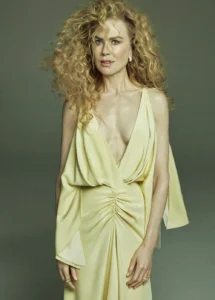
What were they asking you to explain?
Why your character was turned on by certain things. Like by a guy getting a misbehaving dog to heel.
The dog is a metaphor about the beast within us. It’s kind of amazing that the women are asking that. That’s the representation of what you are taming within you. A lot of it is about power and what that does to you sexually.
There’s a very memorable sequence where Harris Dickinson’s character lifts you in a bathrobe while the George Michael song “Father Figure” plays. I’m pretty sure this will be your next meme.
I love that [director Halina Reijn] put me in the bathrobe in that scene, and it’s not a silk bathrobe, it’s a terry. I was like, “Yes, let me sit in this chair and he can dance.” It’s a twist on 9½ Weeks, and then it’s also a bit messy. It was confronting for me, which I love. I was like, “Golly, OK.”
Do you consider it a compliment to be memed?
Of course. You’ve got to let go and be able to make fun of yourself. It’s very much an Australian trait, but I think it’s a necessary trait for life. I know who I am. I try to stay deeply focused on my authentic self and stay with that. Everything else is beyond my control. But let’s wait and see what happens with the [memes from] Babygirl. I may be terribly upset the next time you talk to me.
I watched Keith’s speech at your AFI tribute last spring, and he closed it by calling you “babygirl.” Is this a word that had meaning to you before you got this script?
Even though the word “babygirl” now is used to describe men, right? [Editor’s note for our less chronically online readers: “Babygirl” is TikTok slang for an attractive man.] Babygirl is something that Keith has always used for me. That is separate. That stays in a separate compartment, that’s not up for public consumption. But then when I read it, I was like, “I’ve not read a film like this.” I thought it was incredibly sexy. Really just so raw and dangerous, and I couldn’t believe they were giving us the money to make it.
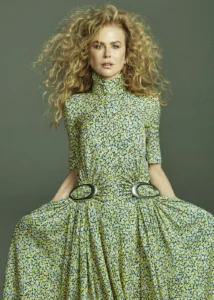
How did you figure out how to play the different types of orgasms in the movie?
(Kidman covers her face with both hands.) I blush, still! That’s insane. But that’s a good thing, I suppose. I’m very interested in exploring those things, but I’m not that extroverted. I was so in character. To pull the curtain back on all of it, it’s too sacred.
Well, let’s try to pull back the curtain a little. The movie starts with what I’ll call a “Hollywood orgasm” with her husband, meaning it’s all about the presentation, all for him. Later, we see orgasms where she’s not worried what anyone thinks of her, and they look and sound very different.
Those ones may not look pretty or sound pretty. Or be what we think is pretty. Halina has always wanted to do something like this. That’s probably why we constantly say we need women in all areas of filmmaking, telling different stories. It’s not just to be more fair. It’s actually because it’s kind of fascinating. And for people to feel, “I can be who I am.” I want people to go see this in the cinema, not just clicking on this at home, secretly, watching it in their own little secret way. There’s something extraordinary about seeing it with a group of people.
